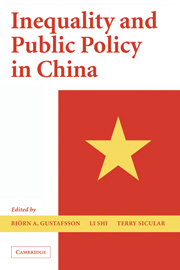Book contents
- Frontmatter
- Contents
- List of Tables and Figures
- Contributors
- Acknowledgments
- 1 Inequality and Public Policy in China: Issues and Trends
- 2 Income Inequality and Spatial Differences in China, 1988, 1995, and 2002
- 3 Growth and Distribution of Household Income in China between 1995 and 2002
- 4 Explaining Incomes and Inequality in China
- 5 The Distribution of Wealth in China
- 6 Growth, Inequality, and Poverty: A Comparative Study of China's Experience in the Periods before and after the Asian Crisis
- 7 What Has Economic Transition Meant for the Well-Being of the Elderly in China?
- 8 Inequity in Financing China's Health Care
- 9 China's Emerging Urban Wage Structure, 1995–2002
- 10 Unemployment, Earlier Retirement, and Changes in the Gender Income Gap in Urban China, 1995–2002
- 11 What Determines Living Arrangements of the Elderly in Urban China?
- 12 The Impact of Village-Specific Factors on Household Income in Rural China
- 13 The Redistributive Impact of Taxation in Rural China, 1995–2002: An Evaluation of Rural Taxation Reform at the Turn of the Century
- Appendix: The 1995 and 2002 Household Surveys: Sampling Methods and Data Description
- Index
- References
13 - The Redistributive Impact of Taxation in Rural China, 1995–2002: An Evaluation of Rural Taxation Reform at the Turn of the Century
Published online by Cambridge University Press: 25 July 2009
- Frontmatter
- Contents
- List of Tables and Figures
- Contributors
- Acknowledgments
- 1 Inequality and Public Policy in China: Issues and Trends
- 2 Income Inequality and Spatial Differences in China, 1988, 1995, and 2002
- 3 Growth and Distribution of Household Income in China between 1995 and 2002
- 4 Explaining Incomes and Inequality in China
- 5 The Distribution of Wealth in China
- 6 Growth, Inequality, and Poverty: A Comparative Study of China's Experience in the Periods before and after the Asian Crisis
- 7 What Has Economic Transition Meant for the Well-Being of the Elderly in China?
- 8 Inequity in Financing China's Health Care
- 9 China's Emerging Urban Wage Structure, 1995–2002
- 10 Unemployment, Earlier Retirement, and Changes in the Gender Income Gap in Urban China, 1995–2002
- 11 What Determines Living Arrangements of the Elderly in Urban China?
- 12 The Impact of Village-Specific Factors on Household Income in Rural China
- 13 The Redistributive Impact of Taxation in Rural China, 1995–2002: An Evaluation of Rural Taxation Reform at the Turn of the Century
- Appendix: The 1995 and 2002 Household Surveys: Sampling Methods and Data Description
- Index
- References
Summary
Introduction
Setting the Agenda
“The agricultural tax has become history” (People's Daily, December 31, 2005). The Chinese government announced abolition of agricultural taxes on January 1, 2006. This was a goal of the “rural tax and fee reform” (hereafter referred to as rural taxation reform) initiated in the late 1990s and an important turning point in rural public policy in China. This chapter examines the redistributive impact of rural taxation using the 1995 and 2002 CHIP surveys and the administrative village survey of 2002. The analytical focus is on changes in tax regressivity between 1995 and 2002.
An empirical study of the redistributive impact of rural taxation is important not only because ad hoc collection of taxes and levies – so-called arbitrary charges, fines, and levies (luan shoufei, luan fakuan, luan tanpai) – has been one of the hottest issues in rural public policy throughout the 1990s, but also because a critical aspect of the Chinese local politico-economic system, that is, the multilayered and decentralized local administrative/fiscal system, is embodied in the issue. So far, however, few empirical studies, with some exceptions such as Khan and Riskin (Chapter 3 in this volume) and Tao, Liu, and Zhang (2003), have used nationally representative microdata to examine the redistributive outcomes of rural taxation.
The structure of this chapter is as follows. In the latter half of this section, the background of the topic is discussed. Section II summarizes the process of rural taxation reform.
- Type
- Chapter
- Information
- Inequality and Public Policy in China , pp. 312 - 336Publisher: Cambridge University PressPrint publication year: 2008
References
- 8
- Cited by



